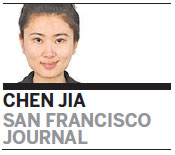The pool of talent between China and the United States is booming, and the competition has been notched up thanks to a series of government initiatives on both sides.
In the US, the encouraging news for highly skilled Chinese professionals on H-1B visas is that their spouses may soon be able to hold down jobs in the US.

H-1B is the guest visa program that allows highly skilled professionals from other countries to work in the US.
Every year, many Chinese H-1B visa holders have to live apart from their spouses to work in the US, as their wives or husbands often have decent jobs and stable incomes back in China. If they are persuaded to come to the US and leave those jobs, they not only lose a second income but also have a gap in employment that makes it hard to get another job when returning to China years later.
"Does the new judicial interpretation of the marriage law in China favor husbands?"said 29-year-old Wendy Xu, who works in finance in Shanghai. "Professors of women’s studies may say yes, while lawyers may say no.
"No matter what the conclusion is, the fact is that more and more Chinese women choose to keep their economic independence after marriage,"she said.
As an H-1B holder, her husband works for a tech company in Silicon Valley. Though his income is enough to afford having them both live in California, his wife refused to quit her job in Shanghai to come to the US.
"If I was allowed to hold a US job, I might consider quitting my job and coming to my husband’s place,"she said. "Or, he has to give up his job and return to China where both of us could develop careers.”
The Obama administration has been urged to make changes, and its first round of initiatives regarding immigration reform was announced last week. About 100,000 spouses of H-1B visa holders can now work in the US thanks to the changes.
The number of Chinese students registered in US colleges and universities represents the highest percentage among all international students, according to data released by the Institute of International Education and the US State Department last year.
A large number of the Chinese graduates in the US are expected to try their luck at getting an H-1B visa before their student visas expire.
The trend reminds the Chinese government of the importance of keeping talent in reserve, particularly among the overseas high-tech elites.
Bi Gang, deputy consul general of China in San Francisco, attended a press conference of the 9th Chunhui Cup Innovation Contest on the night of May 9.
The contest aims to lure more overseas high-tech elites to build closer connections with enterprises, venture capitalists, science and tech parks and research institutes in China.
At the press meeting, Bi encouraged more participants from Seattle and Portland, Oregon, to bring their applications to the San Francisco region in 2014.
Earlier this year, about 30 Chunhui Cup competition winning teams from 2013 gathered at Hanhai Investment, Silicon Valley, to share their success stories and exchange ideas on potential cooperation with some local Chinese science parks.
Some of their projects have already entered negotiations with Chinese city-level science parks and incubators. The projects cover the fields of social networking, intellectual home appliances, culture and media, biomedicine and more.
As China pushes to cultivate world-class science and technology centers, similar platforms and opportunities are easily approached by overseas Chinese in recent years.
Over the weekend, a delegation from Suzhou Industrial Park, in China’s east Jiangsu province, just held an event in Santa Clara to recruit high-tech talent under the 1,000 Talents Project of China.
The 1,000 Talents Plan aims to attract top-notch overseas talents who have the potential to become leaders in their field.
At the event, the delegation introduced Suzhou Industrial Park, including the history of Suzhou, its economic strength, infrastructure development, investment promotion, high-tech and pro-business service, education and human resources and its living environment.
"It’s the best time for overseas Chinese who are also highly skilled professionals. I feel lucky to have so many choices in both China and United States,"said Zhao Liang, a PhD candidate in electronic engineering at Stanford University.
Yue is among 20 Chinese in the San Francisco Bay Area who were just awarded honors for Outstanding Self-financed Students from the Chinese Government, many of whom are strong candidates for the 1,000 Talents Plan.
